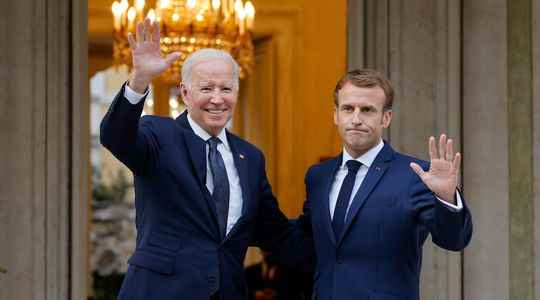For his first state dinner, President Biden chose to invite Emmanuel Macron. A rare favour, a sort of culmination of the reconciliation process launched by the American administration. Just over a year ago, Washington, Cambera and London torpedoed a deal that would see the sale of French submarines to Australia, which drew the ire of Paris and seriously damaged relations. Franco-Americans. Since then, the United States have done everything to make up with France and this visit with great fanfare should be an opportunity for the two countries to show their unity.
This is the second time that the French president has had the honors of a state visit to Washington. Four years ago, he had been received by Donald Trump whom he had tried to convince to stay in the Iranian nuclear agreement. Despite the rounds of the leg and the very tactile demonstrations of affection, he had left empty-handed. This time, “this visit is the sign of the return of Europe to the top of the concerns of American policy and of the importance of France both as a partner of the United States but also as one of the preponderant actors in Europe” , believes Charles Kupchan, former director of European affairs at the National Security Council in the Obama administration and expert at the think tank, Council on Foreign Relations.
“Relations haven’t been this good for a long time, he adds. So this is a visit that celebrates partnership.” Following Brexit and the current turmoil, Great Britain, which has always been the privileged ally, has lost its influence and the German chancellor is keeping a low profile, which has propelled Emmanuel Macron to the rank of main partner. The French president arrives with a series of ministers and personalities including Claude Lelouch, Bernard Arnaud, the boss of LVMH, Patrick Pouyanné, that of TotalEnergies, astronaut Thomas Pesquet and the Francophile American writer Douglas Kennedy. On the menu, three days filled with meetings and public appearances – discussions in the Oval Office, at the State Department, joint press conference, gala dinner, visit to NASA with Vice-President Kamala Harris for a reinforcement of space cooperation…
Biden’s IRA in Macron’s crosshairs
The two presidents will obviously address Ukraine, the next military and diplomatic steps, but also the Iranian nuclear issue and the strategy to be adopted vis-à-vis China. One of Biden’s priorities is for Europeans to support his effort to counter Beijing’s influence in the Indo-Pacific region. They will also discuss the big subject of friction: the Inflation Reduction Act (IRA), a major investment plan in the energy transition which provides, among other things, subsidies and tax credits for electric vehicles and energy renewable as long as they are produced in the United States. These measures, deemed “discriminatory” by Europeans, particularly affect German manufacturers and French subcontractors who produce spare parts for electric cars. This aid, say the Europeans already very affected by the rise in energy prices, risks leading to the loss of investments in Europe and a return to American protectionism. Already several companies, such as the chemical giant Solvay and Iberdrolaa Spanish electricity company, have announced that they will invest across the Atlantic rather than in Europe.
Hence the need for a “resynchronization”, according to the formula of the Elysée, of the economic response to the war in Ukraine and the rise of China. Emmanuel Macron’s message should be this: if America wants a strong European Union to counterbalance Russia and China, it is in its interest not to cause its economic weakening. Several European leaders have called in retaliation for the introduction of similar subsidies to protect their industries. In the meantime, Emmanuel Macron will try to convince Joe Biden to establish exemptions for European companies, like those already in place for Mexico and Canada. However, there is little chance that the French will succeed in drastically revising the IRA. “This is one of the greatest achievements of Biden, who fought hard to get it voted by Congress, continues Charles Kupchan. He is not going to accept major alterations.”
The two presidents will also talk a lot about energy, especially nuclear energy where France wants to strengthen its cooperation with the United States. Another point of contention, the Europeans complain of overpaying for the gas they import from across the Atlantic and accuse the Americans of profiting from the war. But here again, we should probably not expect great progress. Pricing is a matter for the private sector. The Macron couple had given Donald Trump a cutting from an oak tree that he supposedly planted on the lawn of the White House as a gift. What will they bring this time? Mystery, but apparently it does not crash.
